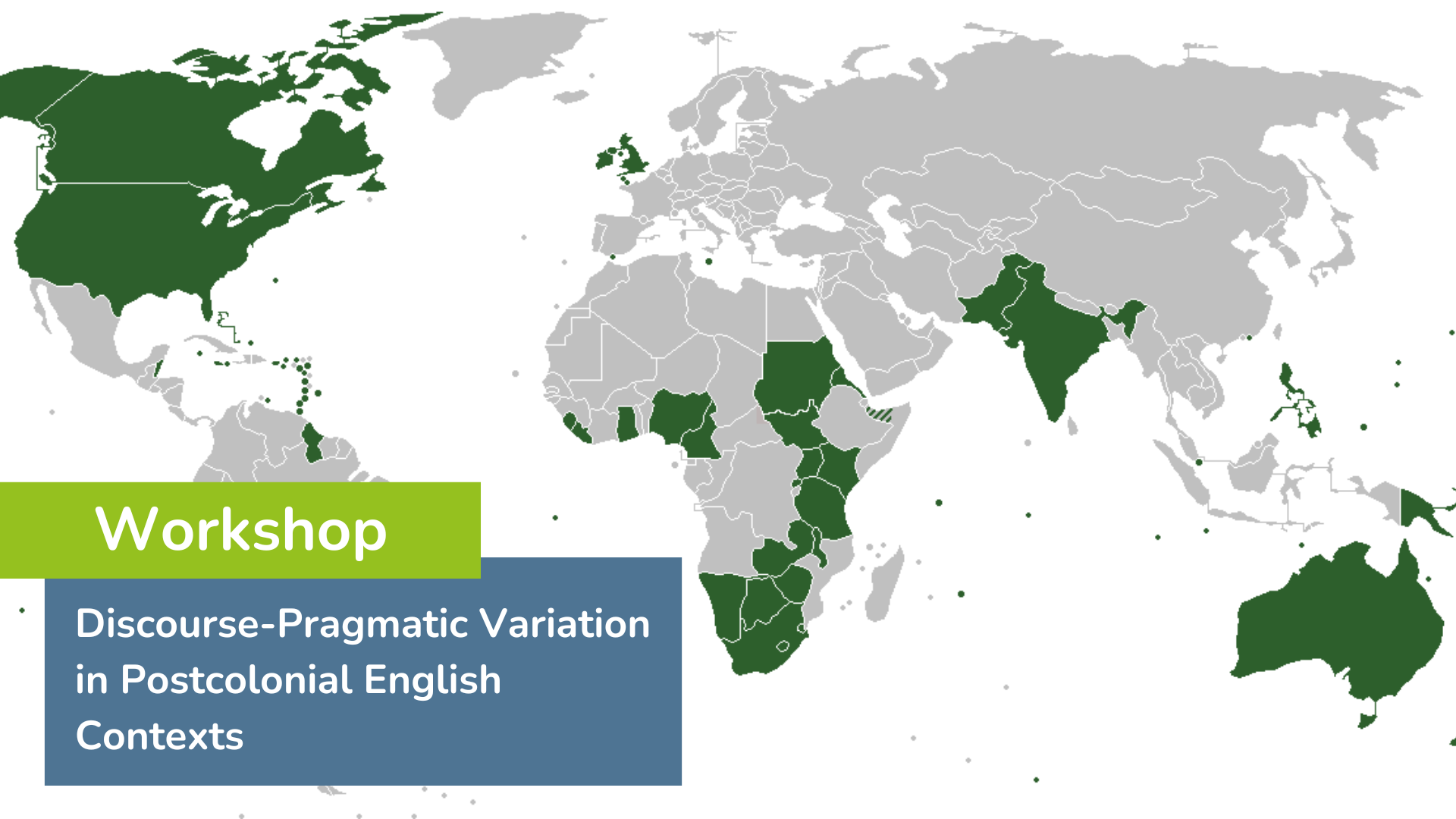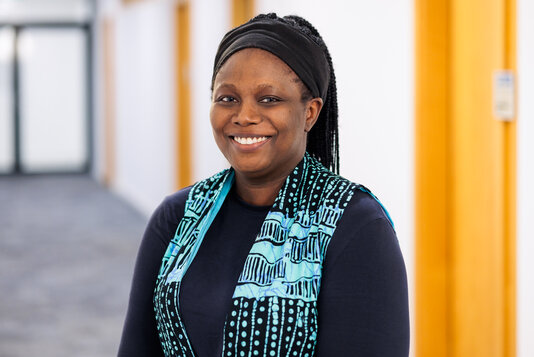
English varieties spoken in African, Asian, and Caribbean multilingual societies are influenced by ethnic languages and cultures of the respective regions, leading to variation in the use of discourse-pragmatic features. This workshop brings together international linguistics scholars to discuss different theoretical approaches and methodologies in the field.

Varieties of English as spoken in African, Asian, and Caribbean multilingual communities as a result of colonialism are influenced by ethnic languages and cultures of the respective regions. This influence is evident in the borrowing of discourse-pragmatic elements from local languages into English, including address terms, interjections, and politeness markers. Moreover, English speech acts, pragmatic markers and contextualisation cues, and discursive constructions of social roles, identities and ethnic orientations are often refunctionalised in these postcolonial English varieties. Discourse-pragmatic variation in postcolonial multilingual and multicultural contexts is the focus of this international workshop that brings together international linguistics scholars to discuss different theoretical approaches and methodologies in the field.
The workshop is organised by Foluke O. Unuabonah, professor of English linguistics at Redeemer’s University, Ede (Nigeria) and currently a Senior Fellow at the College, and Christiane Meierkord (Ruhr University Bochum).
Welcome
Apologising in Nigerian English
Ulrike Gut (in-person)
Tea break
“Well, I am paying”: Payment Negotiation Patterns and Gender on a First Date in Nigeria
Anne Barron, Ezekiel Olajimbiti, Ayo Osisanwo, Akin Odebunmi (in-person)
“yeah. (1.0) but i i always think that the hong kong people prioritise the the international movies sometimes” – Discourse-pragmatic variation in DISAGREEMENTS from Hong Kong
Lisa Lehnen (in-person)
“Charrach, that’s freaking normal, man”: Grammaticalization and contact-induced discourse-pragmatic change in Palauan English
Kazuko Matsumoto (virtual)
Lunch break
Responses to thanks in Nigerian English: A corpus pragmatic analysis of dialogues from ICE-Nigeria
Bruna Almeida-Büttner (in-person)
Multimodal communicative acts in Nigerian religious-oriented 2023 general elections-related memes
Oluwayemisi Olusola Adebomi (virtual)
Tea break
Discourse-pragmatic markers in Ghanaian Pidgin
Jemima Asabea Anderson, Kwaku Osei-Tutu, Bernard Cassie (in-person)
Thanking strategies in Ghanaian and Ugandan Englishes: A corpus-based study
Deborah Fifelola, Foluke O. Unuabonah (virtual)
Conference dinner
Pragmatic variation in the speech acts of greeting and leave-taking: Evidence from Ugandan English
Bebwa Isingoma (in-person)
Tea break
Requests in Nigerian and British English conversational interactions: A corpus-based approach
Ilka Flöck, Onwu Inya, Anne Barron (in-person)
Politeness in Hong Kong business correspondence: investigating genre development and nativization processes from a diachronic perspective
Carina Stick (in-person)
Pragmatic functions of please, sorry, and thank you in Ghanaian English
Rachel Thompson, Jemima Anderson (virtual)
Lunch break
Address terms and politeness in Nigerian English
Temitope Michael Ajayi, Temidayo Akinrinlola (virtual)
Well as a pragmatic marker in Ghanaian and Nigerian Englishes
Foluke O. Unuabonah, Deborah Fifelola (in-person)
Analysing PRAISE in Ugandan English - Corpus pragmatics meets macrosociolinguistics
Christiane Meierkord (in-person)
Final discussion and workshop closing

Prof. Foluke Olayinka Unuabonah
Redeemer’s University (Nigeria) | English Linguistics
Foluke O. Unuabonah is a professor at the English Department, Redeemer’s University, Ede, Nigeria. Her main areas of research include (corpus) pragmatics and discourse analysis. She has published articles on (borrowed) discourse-pragmatic features in Nigerian English as well as borrowed discourse-pragmatic features in Ghanaian, Kenyan, South African and Tanzanian Englishes. She has also investigated social semiotic resources in multimodal texts such as memes and posters, and has explored discourse-pragmatic items in quasi-judicial public hearings.
Foluke Unuabonah has just completed a research project on different speech acts (requests, offers, apologies, refusals, and thanking) in Nigerian English, in a joint project with colleagues at the University of Münster, Germany, and has also compiled the Historical Corpus of English in Nigeria with other colleagues in Redeemer’s University. In her present project, she is carrying out a comparative study of English discourse-pragmatic features, including pragmatic markers, intensifiers and quotatives in Ghanaian, Nigerian, and Ugandan Englishes.
She has been a visiting scholar at the University of Münster, under the Alexander von Humboldt Foundation as well as the Stellenbosch Institute for Advanced Study, South Africa.

Prof. Christiane Meierkord
Ruhr University Bochum | English Linguistics

Prof. Christiane Meierkord
Ruhr University Bochum | English Linguistics
Christiane Meierkord holds the Chair of English Linguistics at Ruhr University Bochum and has previously taught at the universities of Erfurt, Münster and Stockholm, where she was a visiting professor.
She is author of “Interactions across Englishes: Linguistic Choices in Local and International Contact Situations” (2012) and has published extensively on the use of English as a lingua franca, from a descriptive as well as from a sociolinguistic perspective. She has also edited “Ugandan English. Its Sociolinguistics, Structure and Uses in a Globalising Post-Protectorate” (2016), together with Bebwa Isingoma and Saudah Namyalo, and “World Englishes at the Grassroots” (2021), together with Edgar Schneider. She is currently involved in a project that intends to give voice to non-elite users of English, who have often been neglected and marginalised in research on world Englishes in postcolonial settings.
Website
https://www.ruhr-uni-bochum.de/engling/staff/meierkord/index.html.en